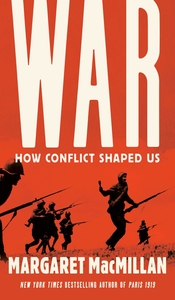War: How Conflict Shaped Us

Speaker: Prof. Margaret MacMillan(Oxford University)
Date: 9 March 2022
Speaker Session Summary
SMA hosted a speaker session with Prof. Margaret MacMillan (Professor of International History, Oxford University) as part of its SMA NDU (INSS/PRISM) Speaker Series.
War has always been a force for change between countries and within society. The relationship between society and war is cyclical as war influences the language people use, how places are named, and encourages social changes. Despite being a mostly destructive force, war forces all individuals to contribute to their society: sometimes in non-traditional ways. Positive societal changes include women’s working and voting rights following their contributions during World Wars I and II. Prof. MacMillan commented that while evolution gave humans the ability to retaliate violently, it also gave humans the ability of altruism and killing another person is mostly unnatural to people. Also, if a society celebrates battlefield heroism regularly, then their people will be more likely to support a war.
Overall, societies can be inoculated to become warlike; however, they can transition back to a peaceful society over time. Prof. MacMillan commented that group cohesion and culture is a key factor in a population’s will to fight. The global democratic shift in governance during the 19th century allowed people to see themselves as citizens, rather than subjects. This association as a member of a large stakeholder group led to an increased willingness to fight for one’s country; even in a war like World War I. War itself is very different from random acts of violence. Instead, war is highly organized and pre-planned. Because of the organized nature of war, soldiers must not only be willing to kill, but more importantly operate as part of a highly integrated team. Societies have even made rules on how to ethically conduct war which includes how to treat civilians and captured soldiers. Because of the relationship between societies perception of war and a country’s ability to conduct war, information warfare will become increasingly important for rallying support and demoralizing enemies in future conflicts.
Speaker Session Recording
Briefing Materials
Biography:
Professor Margaret MacMillan received her PhD from Oxford University and is now a professor of international history at Oxford, where she is also the warden of St. Antony’s College. She is a fellow of the Royal Society of Literature; a senior fellow of Massey College, University of Toronto; and an honorary fellow of Trinity College, University of Toronto, and of St. Hilda’s College, Oxford University. Her published works include The War That Ended Peace: The Road to 1914, a New York Times Notable Book; Dangerous Games: The Uses and Abuses of History; Nixon and Mao: The Week That Changed the World; Women of the Raj: The Mothers, Wives, and Daughters of the British Empire in India; and Paris 1919: Six Months That Changed the World, which won the Samuel Johnson Prize, the PEN Hessell-Tiltman Prize, and the Duff Cooper Prize and was a New York Times Editors’ Choice.
The SMA INSS/PRISM Speaker Series description and list of the other sessions in this series can be downloaded here.
Comments